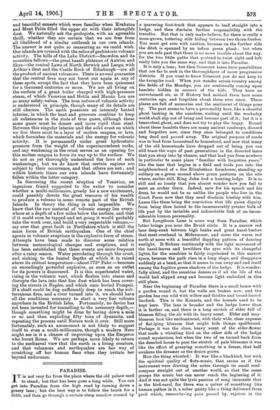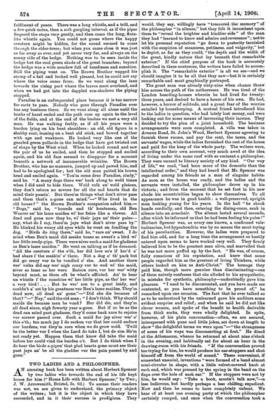. PARADISE.
TT. is not very far from the place where the old palace used
to stand; but that has been gone a long while. You can get into Paradise from the high road by turning down a grassy lane ; but the best way is to follow the brook for a little, and then go through a certain steep meadow crossed by
a quavering foot-track that appears to lead straight into a hedge, and than disclaim further responsibility with the traveller. But that is only make-believe, for there is really a moss-grown, tottering stile hiding between two thorn-bushes. You must get over with caution, because on the further side the ditch is spanned by an infirm green plank ; but when you are safe past that there is no more trouble about the way, for the two little paths that pretend to twist right and left really take you the same way, and that is into Paradise.
It is only a lane; but then Somerset lanes have possibilities that are far to seek in the thoroughfares of more progressive districts. If you want to know Somerset you do not keep to the turnpike road. When you wander across country among the fields of the Mendips, you are continually coming upon hamlets hidden in corners of the hills. They have an unreclaimed air, as if History had mislaid them here some centuries ago, and forgotten about them ever since. These places are full of memories and the sentiment of things gone by. The past seems to have a personality here, like a cheerful ghost basking in the sunshine, waiting until the workaday world shall slip out of being and become part of it ; but it is a benevolent ghost, and does not try to play the bogey. Round about these hamlets there are many ancient roadways, disused and forgotten now, since they once belonged to conditions long dead and passed away. The original purpose of roads was to lead from homestead to homestead, and now that many of the old homesteads have dropped out of being, you can still trace the ways of past generations in the deserted lanes that you stray into by chance, and that lead you from nowhere in particular to some place "familiar with forgotten years," like the lane that begins in a field and leads you into the neighbourhood of a fine Elizabethan farmhouse, standing up solitary on a green mound above green pastures on the site where, earlier still, King John had a hunting lodge. It is so still and so lonely that you almost wonder how you fail to meet an archer there. Indeed, save for his speech and his dress, he would not be so unlike the people who live in the Court Farm now that they need disclaim kinship with him. Lanes like these bring the conviction that life gains dignity from being thus bound to the immeasurably greater bulk of life past by the invisible and indissoluble link of an incon- siderable human personality.
But Longthorn Lane is some way from Paradise, which latter brings you near the Druid circle. It is a narrow red lane deep-sunk between high banks and great hazel-bushes that meet overhead in Midsummer, and cover the warm red earth at noon with a beautiful dappling pattern of dancing sunlight. It flickers continually with the light movement of the hazel-leaves and bewilders the eyes with its changeful lights, for the sunshine is fairly imprisoned in this narrow space, because the path rises in a long slope, and disappears suddenly at a bend, so that it seems to run away and end itself among the fugitive green shadows of the hedge. It is wonder- fully silent, and the sunshine dances as if all the life of the world had slipped away and become light embodied in this still place.
Near the beginning of Paradise there is a small house with a garden round it, but the walls are broken now, and the garden has run wild with willow and thistles and broad-leaved burdock. This is the Kennels, and the hounds used to be kept here. The lane is broader and the hedge lower than it is farther on, and there is a long stretch of elder full of blossom filling the air with its heavy scent. Elder and may- blossom look like enchantment, with their wide, close expanse of flat-lying blossom that might hide things spellbound. Perhaps it was the close, heavy scent of the elder-flower that made a whistling bird on the other side of the hedge sound mysterious, but when the two of us turned back from the deserted house to pass the stretch of pale blossoms it was like the effort of grasping something in a dream, that half awakens the dreamer as the desire grows.
How the thing whistled ! It was like a blackbird, but with the spiritual quality of flute-music, that seems as if the instrument were drawing the notes through its small reed - compass straight out of another world, so that the sense grasps the music but can never reach the beginning of it. And it was not quite the lyric passion of song incarnate that is the bird-carol, for there was a quiver of something like human pathos in it, a sober gaiety like a thing delivered from peril which, remembering pain passed by, rejoices in the fulfilment of peace. There was a long whistle, and a trill, and a few quick notes, then a soft gurgling interval, as if the piper fingered the stops very gently, and then came the long, flute- like whistle again. You could not guess where the happy creature might be hidden, for the sound seemed to come through the elder-trees; but when you came close it was just as far away as ever, and yet never very far, and always on the sunny side of the hedge. Nothing was to be seen inside the hedge but the cool green shade of the great branches; beyond the hedge was a wide meadow full of loneliness and sunshine. Still the piping went on. The Brown Brother wagged his stump of a tail and looked well pleased, but he could not say where the voice came from. So we went along the lane towards the rising part where the leaves meet overhead, and when we had got into the dappled sun-shadows the piping stopped.
Paradise is an unfrequented place because it is too narrow for carts to pass. Nobody who goes through Paradise ever has any business there. So we went along all alone until the banks of hazel ended and the path rose up again to the level of the fields, and at the end of the bushes we met a very old man. He was walking feebly, as if all his years were a burden lying on his bent shoulders : an old, old figure in a shabby coat, leaning on a bent old stick, and bowed together with age and weakness. He looked very like one of the gnarled green pollards in the hedge that have got twisted out of shape by the West wind. When be looked round and saw the pair of us he smiled, and then he stopped and smiled again, and his old face seemed to disappear for a moment beneath a network of innumerable wrinkles. The Brown Brother, who has no manners, jumped up and pawed him, and had to be apologised for ; but the old man patted his brown head and smiled again. " You'm come droo Paradise, zimly," said he. "A many dogs there wer' back along to wold times when I did used to bide there. Wold yolk an' wold pleiices, they don't return no mwore for all the sad hearts that do mind their passin'. But there'm things what don't niver pass and them that's a-gone can mind."—" Who lived in the old house ? " the Brown Brother's companion asked him.— " Dogs," said he, "hounds and th' huntsman, old Ben Weaver an' his lame maiden wi' her feiice like a vlower. All dead and gone now they be, wi' their jays an' their pains— nay, what do I say, there'm jays what don't niver pass by." He blinked his weary old eyes while he went on fondling the dog. "Birds do zing there," said be, "rare an' sweet. I do mind when Ben's maid did meake tunes so sweet's a bird wi' her little reedy-pipe. There were niver such a maid for gladness as Ben's lame maiden." He went on talking as if he dreamed. "All the creeturs o' the e'th, her did love BO'S if heed a' had share i' the meakin' o' them. Not a dog o' th' pack but did go crazy vur to be vondled o' she. And another there wer' yolks did say wer' nigh crazy Nair to wed wi' the maid, niver so lame as her were. Raison zure, vur her wer' witty beyond most, as them oft be what's afflicted. An' to hear un whistle i' the zunshine wi' her little pipe, as tho' her wer' a very bird ! . . . But he wer' son to a great leady, and couldn't a' zet by his greatness vur Ben's lame maiden. They'm dead now, all dead an' gone."—" Did she die because of that? "—" Nay," said the old man ; "I don't think. Why should maids die because men be vond ? Her did die, and they'm all dead since, nigh fowerty year a-gone. But if zo be as the dead can mind past gladness, they'd come back zure to rejoice vur sorrow passed over. Such a maid for jay niver wer' o' this e'th; too much jay I do reckon vur that her could endure our burdens, vur they'm zore when we do grow wold. 'Twill be the better vim I when the Lard do take I, but do zim He'm not ready yet. Happen them that know did take the maid before her could mind the burden o't. But I do think when I do hear the birds a-pipen' that glad hearts gone must see their past jays an' be all the gladder vur the pain passed by and gone."







































 Previous page
Previous page